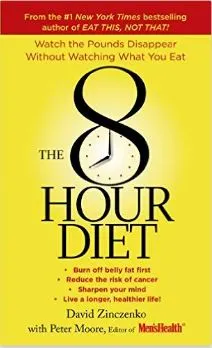Last week I told you about how I never eat breakfast anymore, and that when I was looking around at what people said about breakfast being the most important meal of the day, I ran across this idea of intermittent fasting and the associated idea of losing weight by getting all your meals in during an 8 hour period during the day.
So, this week I of course read The 8 Hour Diet (by David Zinczenko with Peter Moore).
The 8 hour diet premise
According to The 8 Hour Diet, newer research shows that when you eat might actually be more important than what you eat, that our bodies evolved to eat during shorter periods of the day, and that intermittent fasting helps you train your body to burn fat for energy. The book begins (and is peppered throughout) with bold claims that it’s just that easy to eat whatever you want and still lose weight.
Is it really that simple?
No, of course it isn’t. In addition to eating within that eight hour period (for, reportedly, as few as three days a week), the authors also want you to:
- Add in eight “Powerfoods” every day — Basically protein like turkey, fish, chicken, and other lean meats, nuts, low fat yogurt & dairy, beans, fruit, green veggies, whole grains & oatmeal.
- What do you notice about these foods? If you’re skeptical, it may be that they’re filling and fiber-full — so if you are adding these eight foods in and limiting your food intake to 8 hours, you are leaving less room in your belly and less time to consume “whatever you want.” They also suggest including two Powerfoods in any carb heavy meal — where, again, you’re replacing “whatever you want” with “healthy stuff that fills you up.” (OK, yes, a *little* skeptical.)
- Add in an eight minute workout every day before eating anything — with an entire chapter of sample exercises as well as a few throwaway comments along the lines of “and then, work your way up to harder workouts. Combine them into 16-, 24-, or 32-minute workouts.”
- Hey, look: Now you’re adding exercise! 🙂
- Foods to emphasize include lean protein, fiber, healthy fats, brightly colored fruits and veggies. Foods to limit include refined carbs, sugar, saturated and trans-fats, HFCS.
- I don’t even think I need to comment here.
- And about that research…
- The authors throw a lot of facts at you here — but the research that they cite talks about the benefits of intermittent fasting as a whole, and the studies tend to talk about things like alternate day fasting rather than “eat only eight hours a day.” It’s not particular scientific to extrapolate as loosely as they do from many of the studies they cite.
And about that writing style…
Do you like your books on the exclamatory! side! — with lots of attempts at humor along the lines of “you’ll begin to burn through those glycogen stores like a 13-year-old girl through a Justin Bieber fanzine?” If so, you’ll probably enjoy The 8 Hour Diet. If not, you can sit in the corner rolling your eyes with me.
The authors of The 8 Hour Diet are former Men’s Health editor-in-chief (and Eat This, Not That! author) David Zinczenko and Men’s Health editor Peter Moore. I’ve never actually read Men’s Health, but you can tell that both authors are used to writing punchy little magazine squibs that don’t necessarily translate as well into a full-length book. There’s really only enough material here for a substantive magazine article, but they’ve stretched it out into a rather repetitive book; while their writing style made it much more difficult to take their claims seriously or to see The 8 Hour Diet as a credible source.
So here’s the deal…
If it sounds too good to be true, it probably is. I do believe that intermittent fasting can beneficial, and have found that, for myself, skipping breakfast and late night snacking inherently limits how much I eat. However, that’s a far cry from “eat whatever you want, in whatever quantity you want” as long as you only do so eight hours a day — as is most of this book, once you start really delving into what they are saying. Also: Everyone is different and what works for one person won’t necessarily work for another. If your body responds badly to low blood sugar, or if waiting to eat causes you to go nuts with cravings and then consume everything in sight, this sort of diet isn’t going to work for you.
There are a number of books on intermittent fasting, and I’m going to try reading something a little more scientific next time. The topic itself is fascinating, but The 8 Hour Diet just doesn’t do it enough justice.
What are you reading this week?
What have you been reading lately? Tell us about it! ? — and, you can browse all the What’s Rachel Reading? book reviews here.


